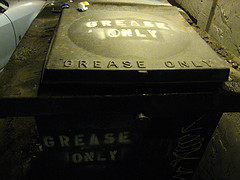
So the city of San Francisco is trying to recycle restaurant grease into biofuel for automobiles, to save the city's pipes from having a heart attack, and to clean our air, and to save the planet from melting, and it's going to be so awesome, even the Chronicle and its self-styled nemesis BeyondChron
manage to
agree on its front-page-worthy awesomeness.
Which is why I think it's funny no one mentioned this has been tried before, and has failed.
Two years ago the Golden Gate Restaurant Association
named Bay Area Biofuel of Richmond its "preferred vendor" for grease recycling, and then in May 2006 I wrote a big front page
article saying the company was growing production based on the partnership, and hoped to soon be profitable. The executive director of the restaurant association said Bay Area Biofuel "has all the right stuff" for the partnership, and according to my notes told me the association had conducted interviews to "find the industry leader" before settling on the company.
In October 2006, my colleague Lizette Wilson checked in with Bay Area Biofuel as part of a industry roundup article. She
found the company still unprofitable, looking for more money from investors and drowning in unprocessed grease ("We need to expand production significantly to keep up with supply and be profitable").
By February of this year, the company's
website had
disappeared.
Then in May, Bay Area Biofuel Inc. of Richmond, CA filed for Chapter 7 bankruptcy liquidation in an Oakland court, according to Dow Jones Newswires' Corporate Filings Alert.
With Bay Area Biofuel gone, the city obviously needed to turn to a different company for its new grease recycling program. It settled on
Blue Sky Bio-fuels of Oakland, which according to the Chronicle has been making biofuel for just two months.
I'm not saying San Francisco's new grease-to-biofuel effort will definitely fail, just that the city and its partner Blue Sky need to be asked what they will do to avoid the fate of Bay Area Biofuel and how certain they are about the sustainability of the restaurant grease recycling program. And coverage of the city's high-profile announcement should take note of the dead corporate body lying on this green road to the future.
By all accounts, including those of restaurateurs I
interviewed in May 2006, restaurants are more likely to recycle their grease -- instead of pouring it down the drain -- if pickup is timely and reliable. There are well-established companies willing to reliably pick up restaurant grease for less glamorous ends than biofuel, as they have been doing for years. If restaurants are going to be encouraged to switch to a new recycler, it should probably be someone who is going to be around for some time to come.
(Photo courtesy nchoz on Flickr via Creative Commons license.)Labels: restaurants, Things deemed to be "awesome"
 Pat Kuleto's two waterfront restaurants, WaterBar and Epic Roasthouse, have fallen two months and at least $2 million behind schedule, I reported in the Business Times on Friday (free link!).
Pat Kuleto's two waterfront restaurants, WaterBar and Epic Roasthouse, have fallen two months and at least $2 million behind schedule, I reported in the Business Times on Friday (free link!).




 So apparently Gary Danko has this fantasy about the end of the world, which involves ... well, read for yourself:
So apparently Gary Danko has this fantasy about the end of the world, which involves ... well, read for yourself:
 Last week I had a date with Laurence Geller, CEO of Strategic Hotels & Resorts and, by extension, the owner of the Westin Saint Francis hotel here in San Francisco. He put me in an apron, plied me with wine, cooked for me in a rooftop kitchen, gave me a signed copy of his rather purple novel "Do Not Disturb" and entertained me with
Last week I had a date with Laurence Geller, CEO of Strategic Hotels & Resorts and, by extension, the owner of the Westin Saint Francis hotel here in San Francisco. He put me in an apron, plied me with wine, cooked for me in a rooftop kitchen, gave me a signed copy of his rather purple novel "Do Not Disturb" and entertained me with  There were warning signs. When, the next day, I called the general manager of the St. Francis, a reliable and trustworthy fellow, he let on that the brasserie plans were, well, in the conceptual stage, but still "likely." And that Michael Mina was in talks but not, shall we say, signed on the dotted line. Michael Mina could not be reached for comment.
There were warning signs. When, the next day, I called the general manager of the St. Francis, a reliable and trustworthy fellow, he let on that the brasserie plans were, well, in the conceptual stage, but still "likely." And that Michael Mina was in talks but not, shall we say, signed on the dotted line. Michael Mina could not be reached for comment.
